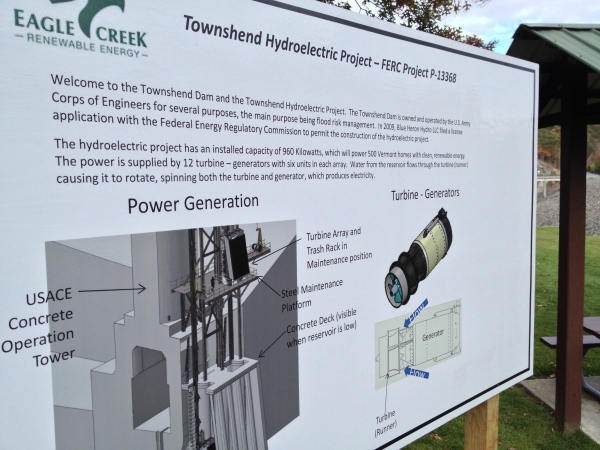TOWNSHEND — Eagle Creek Renewable Energy has traveled a “long road” to get two hydroelectric generation projects up and running in Windham County, a top administrator acknowledges.
The New Jersey-based company finally has reached the end of that road, as newly installed turbines at Ball Mountain Dam in Jamaica and Townshend Dam are now operational. Crews remain on site to handle a few final details, but the projects have been successfully tested and have met state commissioning deadlines, Eagle Creek Chief Executive Officer Bud Cherry said.
“We would expect that no later than the end of June we'll be in full commercial operation,” Cherry said June 9.
“We're pleased that we're finally in a generation mode,” he added. “And we're pleased with what we've seen in the startup testing.”
The hydroelectric stations, which were attached to existing West River dams operated by the U.S. Army Corps of Engineers, are capable of producing a combined 3.1 megawatts of power. Ball Mountain is the larger of the two, producing 2.2 megawatts.
Both are relatively small by hydroelectric standards: For example, TransCanada's Connecticut River hydroelectric stations at Bellows Falls and Vernon can produce 40.8 megawatts and 32.4 megawatts of power, respectively.
But the West River projects' size belied the complexity of permitting and constructing new hydro stations that involve multiple governmental jurisdictions.
Eagle Creek acquired the projects in 2012; earlier that same year, both sites already had received 50-year operating licenses from the Federal Energy Regulatory Commission. Also, the state Public Service Board had extended the projects' commissioning deadline to the end of 2013 - a deadline Eagle Creek expected to meet.
But it turned out that several more state extensions would be needed - first to October 2014, then to December 2015, and then to June 30 of this year.
Meeting Vermont's commissioning deadline is critical, as Eagle Creek - doing business here as Blue Heron Hydro LLC - has a long-term renewable energy purchase contract with the state.
Eagle Creek has said several factors slowed its projects on the West River, including weather and “uniquely complicated” technical work. The biggest issue cited by the company was a lengthy delay in receiving Army Corps of Engineers permits due to a backlog at that agency.
Hydroelectric construction at Ball Mountain and Townshend began in spring 2015. A year later, “the units are substantially complete,” Cherry said. “We have generated electricity. We passed the [state] contract milestone for being in service.”
Vermont Electric Power Producers Inc., a nonprofit that administers two state renewable-energy programs, confirmed that both the Ball Mountain and Townshend projects were considered “online” as of the end of April.
That doesn't mean, however, that the new turbines are generating electricity full time. That's coming soon, but Cherry said Eagle Creek still is “working on 'punch list' items to clean up anything that was of a minor nature.”
“The units are producing power from time to time as they are available to produce power safely,” he said.
Cherry said he expects Eagle Creek will hold a public ribbon-cutting event at the sites later this year.
If it happens at Townshend Dam, the ceremony could draw further attention to silting and low water levels that have rendered the site nearly useless for public recreation. Town and state officials have lobbied for federal help with the problem, but a regional Corps leader has said he can't guarantee that any further dredging work will happen due to budgetary constraints.
Cherry acknowledged that the lack of water at Townshend “limits, to a degree, the amount of generation we can put up on the grid. We will not be able to run at full capacity on a steady basis until the water levels come up.”
But he also said that won't hinder Eagle Creek from putting the hydro projects into commercial operation.
“We're in conversations with the Corps frequently about water levels and other aspects,” Cherry said. “Right now, our relationship with the Corps is very constructive.”
